Lung transplant recipient thanks 'true hero' donor
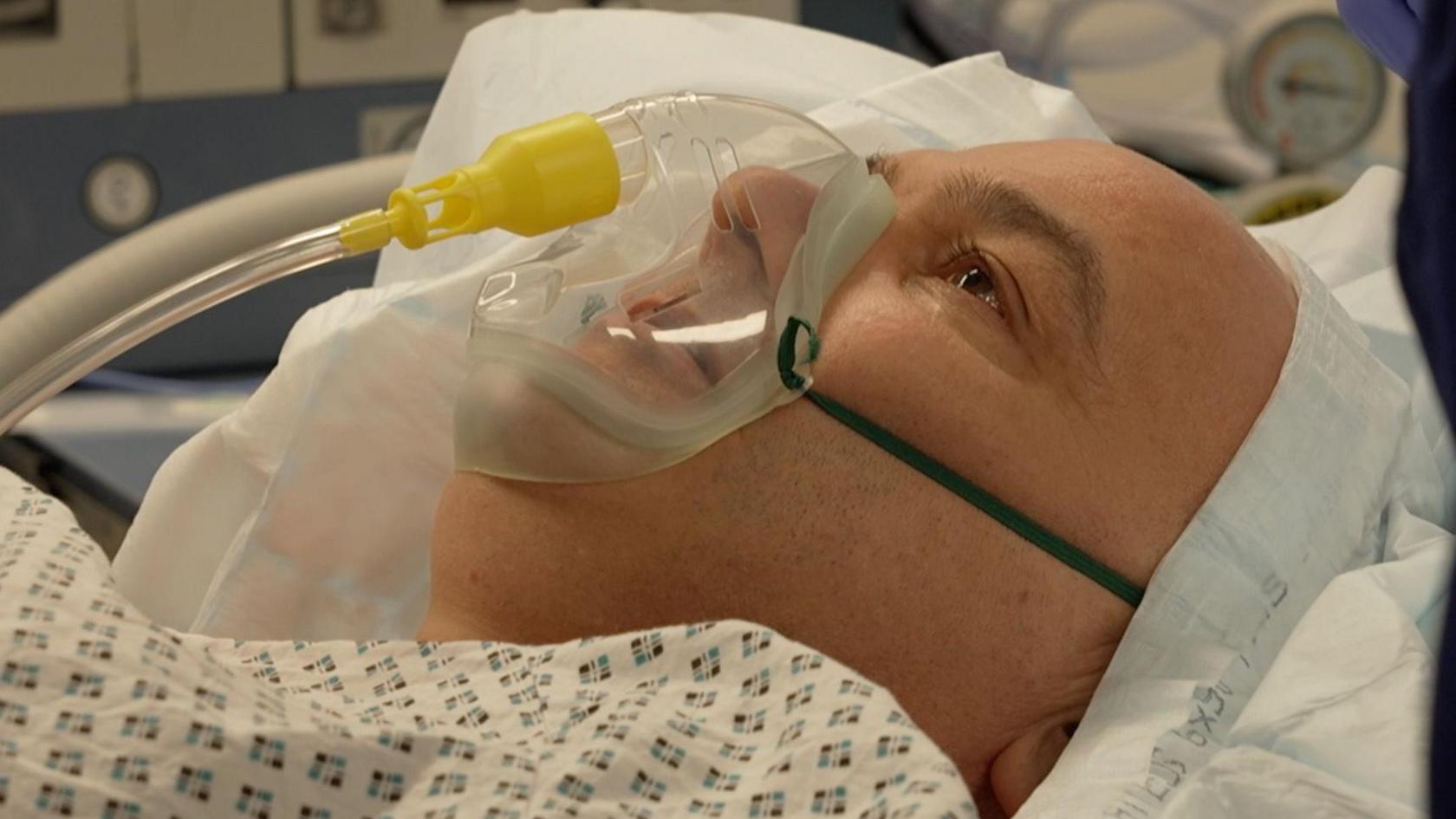
- Published
The first time I meet Sam Atherton he is sitting beside his hospital bed, waiting to hear whether he’s about to get a lung transplant which could save his life.
The 48-year-old is in the late stages of pulmonary fibrosis – a degenerative and often fatal lung disease which has left him continually struggling for breath.
He can only function with the help of a constant flow of oxygen from a tank beside him.
"I know it needs to happen," he says of the transplant. "You look at this disease, you read about it, and your life expectancy is not long.
"It’s got worse over the past few months and particularly the past six weeks or so... it’s quite scary when you can’t breathe."
Around him sit his three children – Connor, 26, Ethan, 22, and Ellie, 20, and his wife Nic.
"I’m under no illusion that I might wake up one morning and I don’t have a husband any more and my children don’t have a father," says Nic.
"So we need to do everything we can to make sure that does not happen."
Sam has been called into the Transplant Centre at Wythenshawe Hospital in Manchester because he is thought to be a good match for a donor today.
Wythenshawe is one of only six centres in the UK which carries out heart and lung transplants on adults.
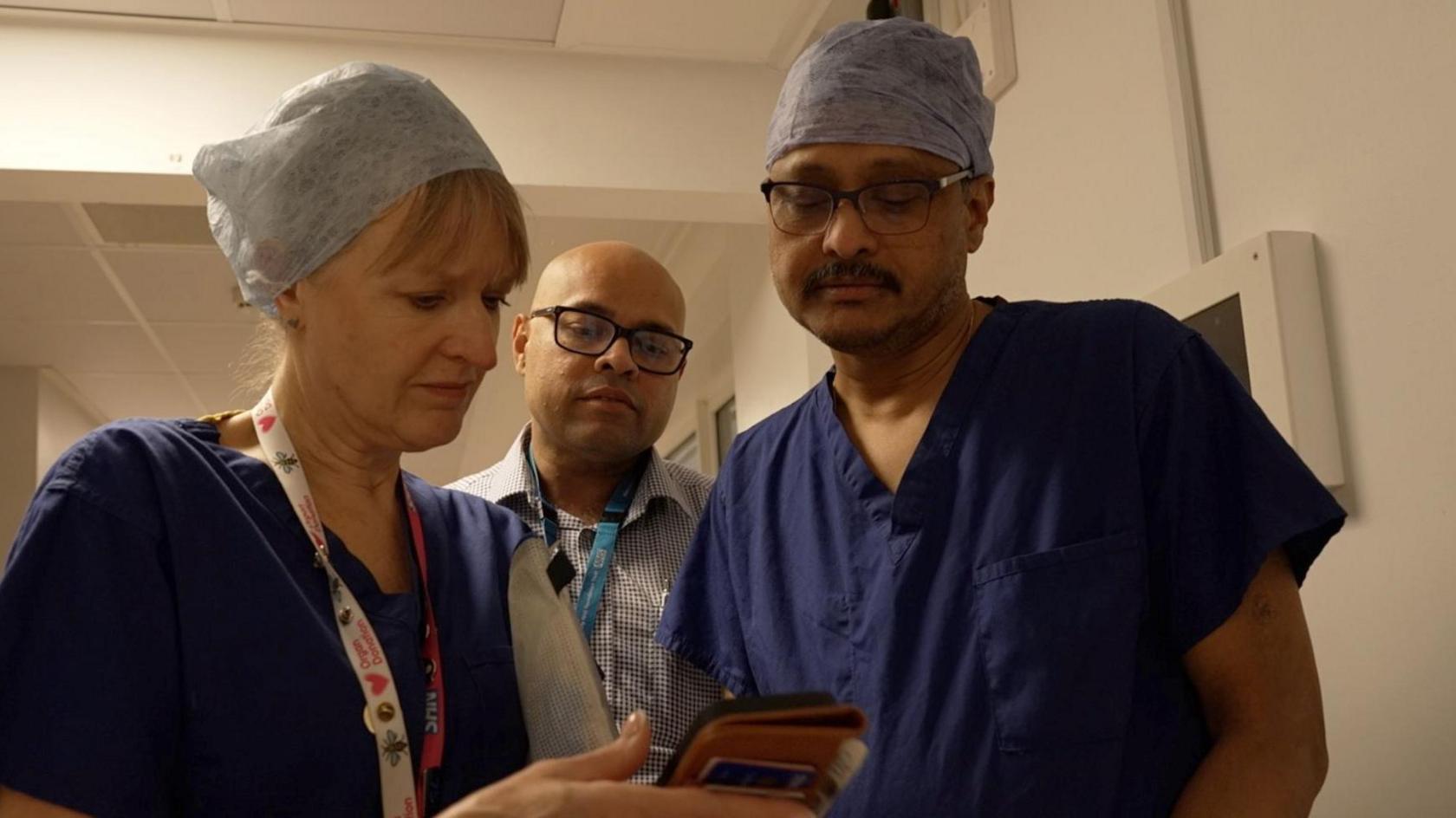
Sam's life is in the hands of consultant lung surgeon Vasudev Pai (centre) and team
While Sam waits nervously, endless messages and phone calls go back and forth between the team at Wythenshawe and the surgical retrieval specialists waiting at the donor’s hospital to assess the suitability of the lungs for Sam.
Recipient patient co-ordinator Jane Nuttall's job is to make sure everything runs smoothly – from booking operating theatres in both the donor and recipient hospitals to ensuring the surgical teams are in synch.
Jane tells me the retrieval team, who are with the donor, have just sent images from a bronchoscopy, a camera which goes down into the lungs.
"So far all looks good," she says. "We’ve had an image sent to us, and myself and the surgeon, we’re happy with that."
'Fingers crossed'
The retrieval team will now physically look at the lungs and carry out a series of tests.
At any point they may discover the lungs are are not suitable for transplant.
"Sometimes there’s injury, there’s trauma if the donor’s been involved in a road traffic accident, sometimes there’s infection,” Jane explains.
Sam’s been here before: last July he was called in after another match.
"I was gowned, shaved," he said. "They just came into the room and said 'Sorry it’s not going to go ahead'.
"I’m just hoping I’m not going to get back into the car and go home today so yes, fingers crossed, everything crossed.
"And pray for the donor as well. Because someone’s had to lose their life for me to gain some lungs."
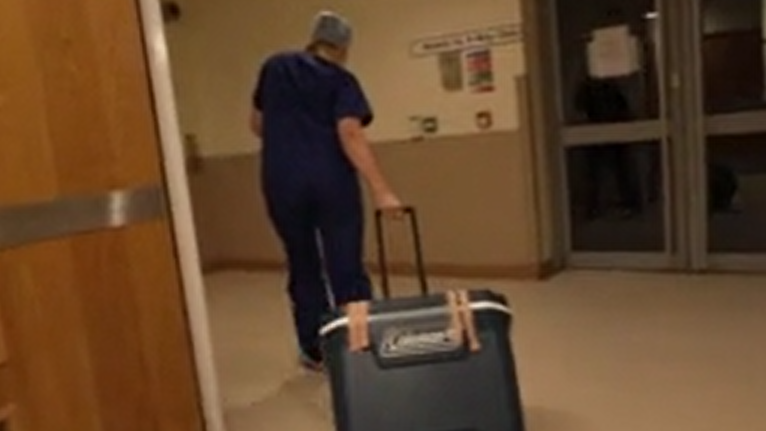
The donors' lungs are rushed into the operating theatre
Eventually Jane comes into the ward.
"I’m coming with some very good news," she says. "It’s going to go ahead."
Sam looks slightly dazed. Nic runs over to her husband, hugs him and sheds a few tears.
Within the hour he is on his way to the operating theatre, having said goodbye to his children. Nic stays with him until he’s put under.
"I just want him to have a lung transplant and have the best chance of living, and carrying on and watch his children grow," she tells me. "This man has now got a chance of life."
By now it is late evening, but the surgical team has the whole night ahead of it. A double lung transplant can take up to 12 hours to perform.
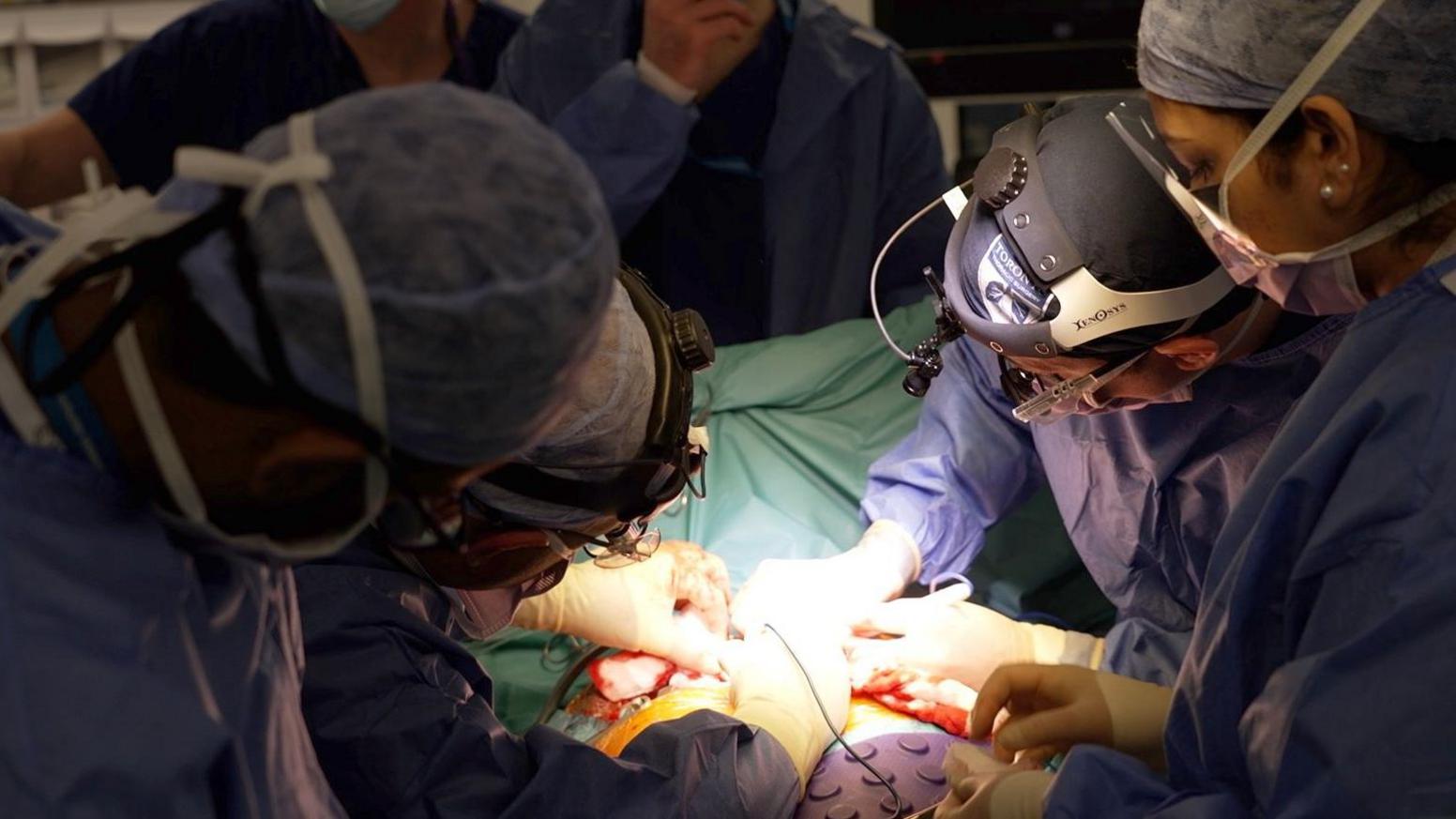
Teamwork and attention to detail is absolutely vital
Sam’s consultant lung surgeon Vasudev Pai says this type of operation calls for resilience from the whole team.
“You have to keep concentrating, with attention to detail, all the time,” he says.
Because the operation takes so long, the surgical team begins while the donor lungs are still en route.
Once they arrive in a freezer box, the first of Sam’s lungs can be completely removed.
They will be replaced one at a time, while Sam’s blood is run through an ECMO (extra-corporeal membrane oxygenation) machine to keep it oxygenated during surgery.
Mr Pai says taking out the old lung can be particularly difficult.
“That’s the crucial stage. If you miss out some small branches and it keeps bleeding post operatively, you can’t see.
"Once you’ve put the new lung in, to go back in and find all these things is very tough."
Even though the size of donor and recipient is one of the many factors taken into account, Mr Pai says there is always a slight difference.
“The lung is always slightly big or slightly small so you have to size it to fit it in... technically it’s quite a challenging thing to do.”
While Sam’s operation finally finishes at 9am, the waiting continues for Sam's family.
He has to be kept unconscious for a further three days to keep him stable while the medical team monitors his new lungs.
'A true hero'
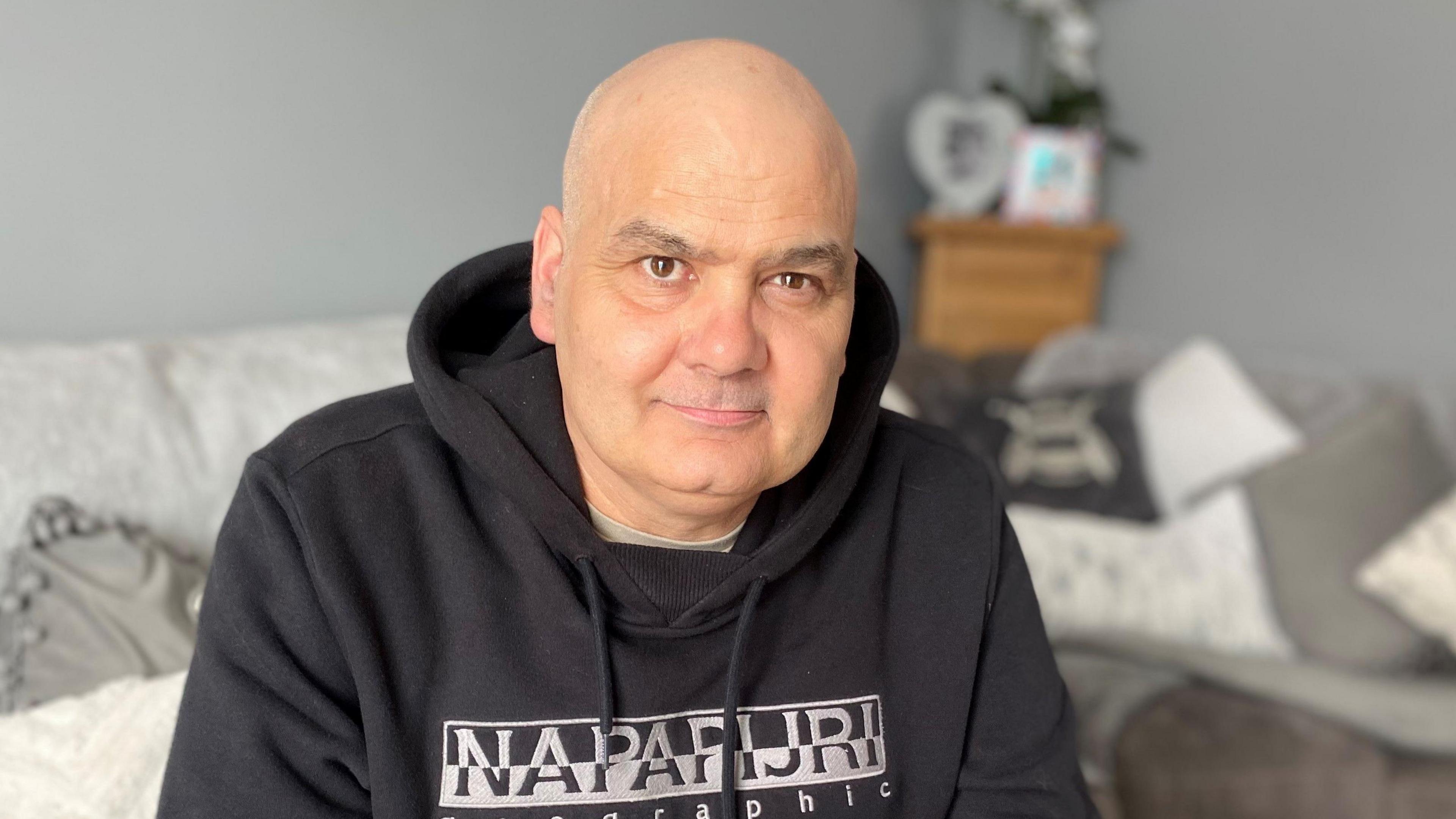
Sam is incredibly grateful to the person who has given him another shot at life
By day six, when we next meet, there's positive news.
Sam is already getting out of his chair for physiotherapy.
"The first day I got out of bed was painful," he reveals.
"All the physios, the nurses, they’re really good. They push you but you need to be pushed, and push yourself as well.
"They say I’m progressing very well… every day’s a better day."
Three-and-a-half weeks after his operation, Sam is out of hospital and recovering at home.
He will spend the first three months being regularly monitored and tested for any signs of infection or rejection of his new lungs.
For the rest of his life Sam will have to take a cocktail of medication: he tells me he is currently on 65 tablets a day, although this will decrease.
His immune system has to be permanently weakened to stop it from attacking his new lungs, leaving him vulnerable to infections and even certain types of skin cancer.
But for Sam, all of that is a small price to pay.
"Knowing that I’m going to be here for my family, knowing that I don’t need to worry about not being here... and that my wife and kids will have to do things without me," he says.
A tear wells up and runs down Sam's cheek. Wiping it away, he continues: "No money in the world can give me what that donor gave to me. My donor is a true hero."